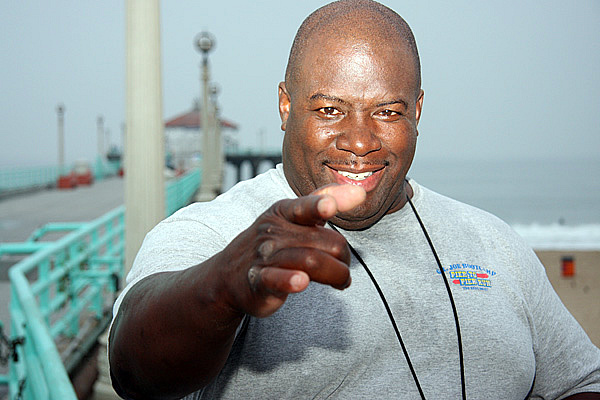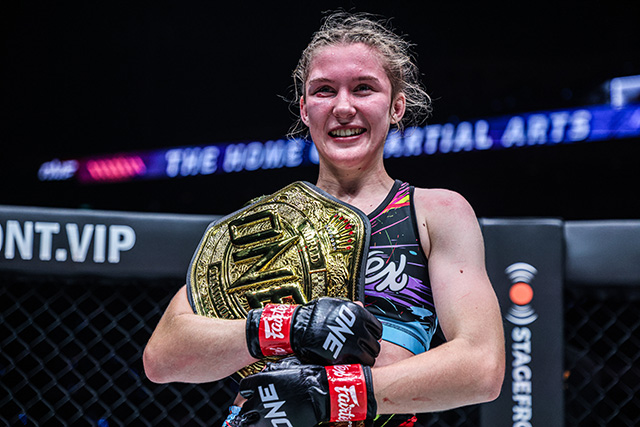Joe Charles: Where is He Now?
One of Those Crazy Guys

Joe
Charles
For a Los Angeles kid raised as the sparring partner for a martial arts-dabbling uncle, Joe Charles got plenty of experience fighting before MMA catapulted him onto the big stage. And he learned early on that the only person that can tell you “no” is yourself.
“When he came home, any time he learned a new kick he’d demo it on us,” says Charles, a veteran of UFC 4, UFC 5 and Ultimate Japan. “I loved the fight game. I was into judo, jiu-jitsu, sambo and wrestling, and I wanted to experience them all before MMA came out. We’d spar, and he’d throw kicks and punches. I kept on getting to the point to where I wanted to learn more. I’d try and practice myself. I got my butt beat in the beginning.”
Advertisement
“I was at work and was run over by a forklift in 1982. It broke my right femur in half. They told me I’d never fight again,” he says. “I was just trying to walk. I didn’t want to believe that. So from that day on I was working out in the hospital every day. I was doing 1,000 situps a day. I was doing anything and everything I could to keep my confidence up. In fact, one of my doctors told me to do three steps today and do four tomorrow in the sand dunes. I was running on the beach. Every day I’d take another step. It took me until 1986 until I was able to fight. I wasn’t strong enough. When I threw a kick I’d fall straight to the ground. That’s why my ground fighting got better.”
‘One of Those Crazy Guys’
For Charles, the thrill of competition was always enough to get him motivated, seeking the kind of rush that stays with him to this day. And with a crowd watching the stakes go down, it made even a birthday celebration all the more reason to entertain while competing.
“I was one of those crazy guys. Instead of a birthday party, I’d throw a grappling bash,” says Charles, 51. “My biggest one was when I turned 42. It was right after 9/11, in Manhattan Beach. The number of years you were, that’s how many people you had to grapple with. If you were a newcomer, you’d fight for 30 seconds, but if you had been experienced, you got to fight a couple minutes. Michael Buffer came and refereed our matches. We put on a show. I did it two years in a row, and then, the next year, a buddy caught me in an ankle lock in the last two seconds of our match. I kept going, but after that, I realized it was time to be an old man.”
Like many of its earliest competitors, Charles felt the immediacy of MMA and the void it filled for martial artists like himself. They had spent years competing in disparate disciplines, with strategically limited rules, and now the opportunity presented itself in the original “style versus style” billing that defined the earliest days of stateside MMA.
However, he struggled with the scant purses and money available to turn it into a full-time vocation. By the mid-1990s, opposed by a consortium of state commissions, politicians and other opponents, MMA’s explosion on the public consciousness was petering out due to fewer and fewer places to hold events, dwindling pay per view sales and availability on carrier networks.
“I thought it had the opportunity to grow, but they got that controversy [with it]. Everybody was fighting about who’s gonna take over,” Charles says. “I was, like, ‘I need to make a decision. I’m not able to make money and support my family.’ I always felt it had the opportunity to grow. I felt it would be bigger than boxing.”
Charles competed in four of the early UFC events: UFC 4, UFC 5, Ultimate Ultimate 95 and UFC Japan. As an alternate at UFC 4, Charles dispatched Kevin Rosier in 14 seconds via armbar.
“It was a serious rush. Just knowing I had to walk into the ring, I felt like I was untouchable. I wanted to find out what my true skills were, where I can go out and take care of business,” Charles says. “I always felt like I wanted to fight every gangster that was bad in the street. I felt like I was superhero. I was, like, ‘I’m living that dream. I’m untouchable.’ When me and Kevin stepped into the ring, I was like in a whole ’nother world. I let everything go and just had a good time. He hit me [with] a couple punches. I hit him on the chin and then went for an armbar. He tapped out.
“Going into my first match, I always felt like I was a tough guy and had skills. I didn’t realize after winning that match, I was probably the cockiest person in the town,” he adds. “I was like, ‘Well, UFC, these guys ain’t nothin’. I got too cocky, and I’m sitting in the audience with women [at UFC 5], and it’s five minutes till my next fight. I should’ve been humble and all that, paid attention to being in the fight world, instead of paying attention to the fact that people looked pretty.”
Returning to UFC 5, he was submitted by Dan Severn in 99 seconds.
“To me, Dan wasn’t that powerful. I felt like I was having a great time with him, until I made a mistake,” Charles says. “We joked about it after the fight. He put his leg over my head; anything there, I was hitting it. His groin was there, so I did. He told me after the fight I made him piss blood. He just got to the back, got a good back choke on me and just held it. I made my mistake by climbing up the fence. You could grab it back then. It was a perfect move on his part.”
Charles defeated Scott Bessac via arm lock at Ultimate Ultimate 95 and lost to Vitor Belfort by armbar in 1996’s Ultimate Japan. He also fought sporadically from his 1994 debut through 2000, compiling a record of 6-13.
Devastating Loss
The buzz was what hooked him. It came from stepping into the fight arena, knowing that all eyes were on him and that the ensuing combat to take place was entirely of his own making. It was not an easy addiction to ignore, and he indulged it whenever he could.
“
rush. Just knowing I
had to walk into the
ring, I felt like
I was untouchable.
”
He takes the same approach in training people today as a fitness guru turned businessman. For the past decade, Charles has run a fitness program called “GI Joe Boot Camp.” Advertised on his Web site, www.mbbootcamp.com, he is a personal fitness coach and motivator. Pushing yourself physically is a gateway toward obtaining that rush he felt during his fighting days.
“You’re in a whole different world. I try and take people to that same world. A lot of people never got that chance to experience getting past the dark side. You got injuries and bruises and you feel like your life is about ready to go,” Charles says. “Then you get to that other side.”
Related Articles







